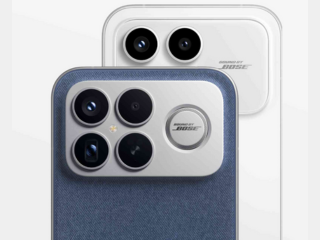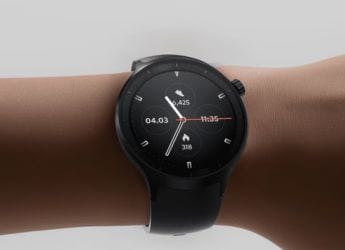- Home
- Wearables
- Wearables Reviews
- Fire Boltt Phoenix Ultra Review: Got the Looks, but What About the Rest?
Fire-Boltt Phoenix Ultra Review: Got the Looks, but What About the Rest?
Looks aside, there’s little reason get this one

The Fire-Boltt Phoenix Ultra is priced at Rs. 2,999 in India
In a sea of budget smartwatches, Fire-Boltt's Phoenix Ultra stands out. This is mainly because of two factors — its price and design. The smartwatch is currently available in India at Rs. 2,199 makes it one of the most affordable smartwatches to sport a classic watch design and metal body, which feels familiar and appears more like a traditional timepiece than a smartwatch. I was a bit excited to see how it was possible to deliver such a device at this price point, but after a couple of weeks of use, I think know how it pulled it off.
Fire-Boltt Phoenix Ultra price, design and specifications
The Fire-Boltt Phoenix Ultra is currently available in single option which is officially priced at Rs. 2,999, but can be purchased for as low as Rs. 2,199 from online retailers. Fire-Boltt provides the smartwatch with a silicon strap, an extra magnetic metal loop strap, and a two-pin magnetic charger in the box.
The smartwatch is available in three case finishes – steel, black and gold. These finishes come with various strap combinations in the box. I received the steel finished case with a magnetic blue metal strap and soft grey silicone strap.
![]()
The Fire-Boltt Phoenix Ultra has a metal case and a 3D-curved display glass
At a glance, the steel finish of the 44mm case sure looks classy and very similar to traditional timepieces. For an entry-level smartwatch, the finish of this metal case is surprisingly good and devoid of any sharp or rough edges. The back of the case is made of plastic with the sensor laid out dead-centre and the metal charging contacts closer to the edge above it. The Fire-Boltt Phoenix Ultra weighs 55g without the strap and also has an IP67 rating for dust and water resistance.
The Fire-Boltt Phoenix Ultra with both metal and silicon straps is quite comfortable and does not feel heavy. The 22mm silicone strap has a quick release mechanism for attaching itself to the case. The metal loop strap has a strong magnet to hold the watch in place. During the review period, the watch never came undone no matter which strap I used.
![]()
Fire-Boltt also offers an extra magnetic metal loop strap in the box
The Fire-Boltt Phoenix Ultra has a rather basic 1.39 inches LCD display with a resolution of 240 × 240 pixels and a standard 60Hz refresh rate. It is surrounded by some really chunky bezels and the display in my unit seemed misaligned as the bottom bezel was a lot thicker than the rest.
The smartwatch has only one button and pressing it either wakes the display and shows the watch face or turns the display off. If you are in any other menu or app in the watch interface, pressing the button gets you back to the watch face directly.
Fire-Boltt Phoenix Ultra software and performance
The Fire-Boltt Phoenix Ultra offers a very basic software interface. While it lacks any support for third-party apps, even the basics aren't covered here. For example, there's no way to set the display timeout on the watch, which is set to five seconds by default. There's no basic calculator app either. I could not even check the charging status of the watch.
The Fire-Boltt Phoenix Ultra needs to be disconnected from the charger in order to view the watch face, which is the only place that displays the battery status. Setting an alarm, timer or stopwatch requires one to enter the settings menu, which is a layer down from the main menu.
![]()
The display on the Fire-Boltt Phoenix Ultra seems to be misaligned
Navigating this simple software interface is quite easy using swipe gestures, which is why the usefulness of the crown is reduced to simply powering the display on or off as the flick-to-wake gesture also works just fine.
Moving to the companion app, it's as basic as the smartwatch's UI and is available for both iOS and Android smartphones. The Da Fit app has three main sections — Today, device settings and My (which is basically the user's profile). Setting up the app using an Android smartphone was a fairly easy experience, its just that you have to keep the app locked in the phone's Recents menu to keep receiving notifications on the watch.
![]()
The Da Fit companion app has a simple interface
The Today page display's readings from the Fire-Boltt Phoenix Ultra which includes step count, sleep, heart rate, blood oxygen levels, along with exercise records. The device settings section lets you change the watch face, adjust notifications, set alarms etc. There is an important section called Others buried deep in here that let me set the time format, unit system, DnD timings, continuous heart rate setting intervals, and most important of all, the auto-lock or display sleep setting, which is not accessible on the watch.
One can use GPS connected exercises like outdoor runs or walks only via the Da Fit mobile app as the Fire-Boltt Phoenix Ultra does not have built-in GPS. What I did find odd is that the watch will never sync data to the app unless you enter the mobile app and swipe down to refresh the data in the Today section.
The watch face gallery has a handful of preinstalled watch faces (including one of Mahendra Singh Dhoni), but opening up the online gallery using the mobile app gave me access to plenty more downloadable ones, which appeared a lot more interesting. However, I did not manage to download and install a watch face even though these were barely 159kb in size. During this time, neither smartwatch nor the app is accessible, which can get frustrating.
![]()
It's hard to tell which app a notification comes from on the Fire-Boltt Phoenix Ultra
Notifications from the smartwatch are truncated. But it's hard to tell which app they're coming from as there is no clear iconography to indicate the same. Setting a timer on the smartphone will also push constant notifications for each passing second, filling up the notifications menu on the smartwatch.
Health tracking is another reason why most users go in for a smartwatch these days. Sadly my experience with the Fire-Boltt Phoenix Ultra was far from great. To begin with the watch only offers two automated health monitoring features. The first one is sleep monitoring, which attempts to deliver detailed sleep stage data or reports like deep sleep, light sleep, REM sleep and more.
However, I found this data to be far from accurate as the watch often counted my time resting in bed (before falling asleep) as time spent sleeping due to which the resulting data turned out inaccurate. Continuous heart rate monitoring was another automated health-tracking feature and it is customisable letting you choose the interval.
Regular heart rate measurements were inaccurate, inconsistent and quite unreliable when compared to the measurements provided by a standalone oximeter. SpO2 readings were a bit more reliable but still not consistent.
The Fire-Boltt Phoenix Ultra offers up to 123 fitness tracking sport modes. I tried out the basic step tracking feature using the Walking exercise mode and the watch managed to detect 505 instead of 500 steps, which seemed fine for a smartwatch at this price point. However, this is not a smartwatch I would choose for health and fitness tracking.
The Bluetooth calling feature works as expected and setting up the feature did not require me to pair the watch twice with the Android smartphone either. The caller could be heard loud and clear and wasn't able to tell that I was calling from a smartwatch.
![]()
The magnetic charger fits snuggly in place while charging the Fire-Boltt Phoenix Ultra
In terms of battery life, I found that the Fire-Boltt Phoenix Ultra could deliver on its claimed battery life of seven days. This is possible mainly because the watch barely offers any auto-health tracking features since a majority of them have to be activated manually. Even data syncing does not take place automatically. Day to day battery drain was around 15-20 percent which included one short workout routine and sleep tracking. The automated heart rate monitoring, despite throwing up a warning, did not seem to affect battery life drastically provided I set it to 30 minute intervals. Charging the Fire-Boltt Phoenix Ultra does take a while. When connected to a 33W charger, it took around two hours.
Verdict
It is difficult to beat the Fire-Boltt Phoenix Ultra when it comes to looks at this price, and that is sadly the only reason why could consider one. For everything else, there are much better options in the market.
If you are looking for accurate health-tracking features in a wearable, then the basic fitness band like the Amazfit Band 7 (Review) is definitely a more reliable option (at a lower price). Those looking for something fancier or closer to a smartwatch (with features like a larger display, Bluetooth calling and automated health tracking features), will find the new Redmi Watch 3 Active, a much better choice at Rs. 2,999. If you are looking for a premium-looking smartwatch, the OnePlus Nord Watch (Review) surely seems like a better choice at Rs. 4,999.
Catch the latest from the Consumer Electronics Show on Gadgets 360, at our CES 2026 hub.
- Samsung Galaxy Unpacked 2025
- ChatGPT
- Redmi Note 14 Pro+
- iPhone 16
- Apple Vision Pro
- Oneplus 12
- OnePlus Nord CE 3 Lite 5G
- iPhone 13
- Xiaomi 14 Pro
- Oppo Find N3
- Tecno Spark Go (2023)
- Realme V30
- Best Phones Under 25000
- Samsung Galaxy S24 Series
- Cryptocurrency
- iQoo 12
- Samsung Galaxy S24 Ultra
- Giottus
- Samsung Galaxy Z Flip 5
- Apple 'Scary Fast'
- Housefull 5
- GoPro Hero 12 Black Review
- Invincible Season 2
- JioGlass
- HD Ready TV
- Laptop Under 50000
- Smartwatch Under 10000
- Latest Mobile Phones
- Compare Phones
- Tecno Spark Go 3
- iQOO Z11 Turbo
- OPPO A6c
- Samsung Galaxy A07 5G
- Vivo Y500i
- OnePlus Turbo 6V
- OnePlus Turbo 6
- Itel Zeno 20 Max
- Lenovo Yoga Slim 7x (2025)
- Lenovo Yoga Slim 7a
- Lenovo Idea Tab Plus
- Realme Pad 3
- Garmin Quatix 8 Pro
- NoiseFit Pro 6R
- Haier H5E Series
- Acerpure Nitro Z Series 100-inch QLED TV
- Asus ROG Ally
- Nintendo Switch Lite
- Haier 1.6 Ton 5 Star Inverter Split AC (HSU19G-MZAID5BN-INV)
- Haier 1.6 Ton 5 Star Inverter Split AC (HSU19G-MZAIM5BN-INV)













